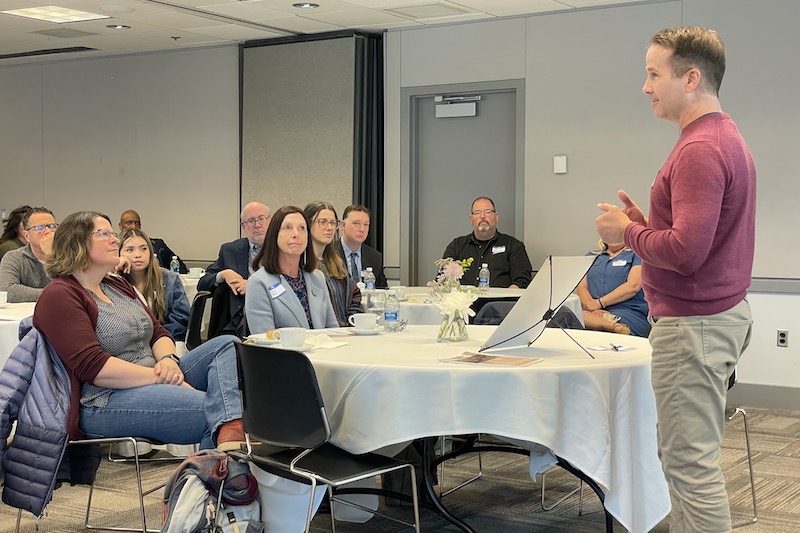


Fighting distractions and disinformation in the age of AI
Photos courtesy of Jon Cox | Photo illustration by Alyson Boyle July 08, 2025
UD-led seminar teaches Delaware educators lessons on digital citizenship
Middle school language arts and English teacher Alyssa Lucadamo had “played around” with ChatGPT to see how it works and what would happen when she fed it some of the writing prompts she gives her students. She also has colleagues who use the AI program for different aspects of teaching, like summarizing longer texts for students.
But she became alarmed when she started seeing evidence that some of her seventh and eighth students at P.S. duPont Middle School in Wilmington were using ChatGPT in their written work.
So she jumped at the chance to deepen her understanding of AI and its benefits and drawbacks, as well as ways to handle online distraction and disinformation, through a seminar specifically for Delaware K-12 teachers sponsored by the University of Delaware’s Delaware Teachers Institute (DTI).
DTI is a UD faculty-led professional development program offered to teachers in all New Castle County school districts. Each year UD professors develop and teach rigorous seminars on topics requested by educators in the districts. The teachers develop curricula from the content, which they implement in their classes the following year.
Lucadamo was one of 11 participants in “Combatting Distraction and Disinformation,” a year-long course taught by Matt Kinservik, professor in UD’s Department of English.
Through lessons on topics such as the evolution of distraction, disinformation as a byproduct, and the American legal and media context, the teachers learned how distraction and disinformation are systemic problems in today’s media ecosystem and how the explosive growth of generative AI is making things worse, especially as some AI companies move to adopt revenue generating models based on maximizing user engagement.
Beyond distraction
The breadth of the seminar was eye-opening for the educators. Kinservik said they began the course wanting to focus immediately on disinformation, but soon realized that the issues are more complex because we "live in a society that is engineered to distract us 24/7."
Lucadamo could relate. She said distraction is a major issue in both middle school classrooms and at home, as many students are using smartphones for the first time while they are still learning how to control their impulses. They don’t understand how features like autoplay and algorithm-based recommendations are designed to keep viewers engaged longer.
“I've seen students come into school exhausted because they were up late getting sucked down a YouTube rabbit hole or playing a game,” she said. ”This seminar helped me understand how those systems are designed to maximize engagement.”
Krista Liss-Stoume, a computer science teacher at Newark Charter Junior High School, agreed. She registered for the seminar looking for ways to not only help her students, but to also grow her own understanding of how to navigate today’s digital world more critically and responsibly.
“It was deeply alarming to realize how little was being done — both in terms of regulation and, more foundationally, in education,” she said. “I wanted to gain as much knowledge and understanding as possible so I could do my part — at the very least by educating my students and helping them navigate this complex digital world.”

From professional development to personal mission
The course made Liss-Stoume have what she called a powerful realization about the general lack of understanding about AI.
“Most people seem to fall into one of two extremes. They’re either terrified and overwhelmed by it, or they’re embracing it enthusiastically without really understanding how it works. In both cases, there's a gap in awareness. For many, AI feels too ‘techy’ and complicated — something best left to the experts. And as a result, ignorance or apathy takes over,” she said.
Liss-Stoume’s professional development course became a personal mission after ChatGPT confirmed that generative AI could be used to manipulate users. She created the AI Awareness Project, a Facebook page that posts updates, tips and insights so followers can stay informed and make smart decisions in an AI-driven world.
“Uninformed individuals are the easiest to manipulate, and I couldn’t ignore the role I could play in helping others become more aware,” she said. “My goal is to help others start asking better questions about the technology shaping our world, before the answers are chosen for them.”
The project has become a family affair as her daughter, UD alumna Emma Liss, is managing an associated Instagram account, and her son Jonathan Liss, a senior computer science major, is helping build a website for it.
“I think it’s important for the younger and upcoming generation to learn how to use AI productively, not abuse it in ways that make them complacent or, worse, dumber,” he said. “AI should be a tool that helps people think more deeply and creatively, not something that replaces thinking altogether. That’s why awareness and education are so important.”
Expanding the reach
Lucadamo will incorporate lessons she learned into a unit on propaganda for her seventh graders next year, while Liss-Stoume will teach a new unit called “Generative AI: What It Is, How It Works, and Why It Matters.” Their curriculum, along with those of the other participants, will be posted to the DTI database, which is open to teachers across the country thanks to a partnership with the Yale National Teachers Initiative.
The course also helps the teachers meet Delaware’s Digital Citizenship Education Act, which requires First State teachers to offer instruction at all grade levels about online safety, information literacy and disinformation. Kinservik invited Alyssa Moore, lead in the Delaware Department of Education’s Office of Digital Learning to share with the seminar participants the resources she and her colleagues have developed to help teachers understand and implement the instruction required to fulfill the aims of the legislation.
Contact Us
Have a UDaily story idea?
Contact us at ocm@udel.edu
Members of the press
Contact us at mediarelations@udel.edu or visit the Media Relations website

